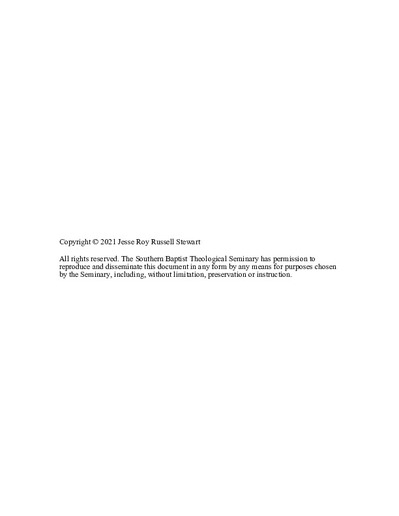| dc.contributor.advisor | Schreiner, Thomas R. | |
| dc.contributor.author | Stewart, Jesse | |
| dc.date.accessioned | 2021-09-03T15:00:19Z | |
| dc.date.available | 2021-09-03T15:00:19Z | |
| dc.date.issued | 2021-05-03 | |
| dc.identifier.uri | https://hdl.handle.net/10392/6584 | |
| dc.description.abstract | What precisely does the author of Hebrews refer to when he states that [Χριστὸς]... διὰ πνεύματος αἰωνίου ἑαυτὸν προσήνεγκεν ἄμωμον τῷ θεῷ? It is the contention of this paper that the New Testament hapax διὰ πνεύματος αἰωνίου in Hebrews 9:14 denotes the Holy Spirit. Moreover, this phrase describes the Spirit’s instrumental function as the applicator of the blood of Christ. The grammatical juxtaposition of διὰ πνεύματος αἰωνίου in 9:14, with “sprinkling” (ῥαντίζουσα) in 9:13, suggests that the Holy Spirit acts as the “superior hyssop branch” through which Christ offers his sacrifice to God. Furthermore, προσήνεγκεν is employed to describe Christ’s priestly “offering” in the heavenly Holy of Holies, which the author understood to be offered via a hyssop branch. Therefore, the prepositional phrase διὰ πνεύματος αἰωνίου which modifies προσήνεγκεν, naturally describes the Holy Spirit as the sacerdotal “instrument” through which Christ presents the benefits of his self-sacrifice to the Father. | en_US |
| dc.subject.lcsh | Bible. Hebrews IX, 14--Criticism, interpretation, etc. | en_US |
| dc.subject.lcsh | Jesus Christ--Person and offices | en_US |
| dc.subject.lcsh | Holy Spirit--Biblical teaching | en_US |
| dc.title | The Eternal Spirit as the Superior Hyssop in Hebrews 9:14 | en_US |
| dc.type | Electronic thesis | en_US |
| dc.type | Text | |
| dc.type.qualificationname | Th.M. | en_US |
| dc.publisher.institution | Southern Baptist Theological Seminary | en_US |
| dc.publisher.department | School of Theology | |

